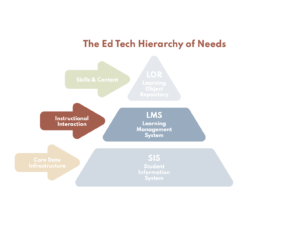Classroom Management in the Cloud

Every teacher knows that classroom management can make or break a school year. We pore over our procedures and expectations leading up to the first day of school just to make sure that we are setting our students up to be as successful as they can possibly be. Classroom management isn’t just about keeping order during a school day. It is also about teaching students how to evaluate situations and make the best possible choices in order to maintain control of the outcomes, a very important life skill. There are stacks of books about classroom management in the traditional classroom. But what happens when your classroom is online, like mine?
As a virtual middle school teacher, I no longer have to worry about hallway behavior, inside voices, and how to clean up at the end of the day. So, what am I supposed to do to teach my students how to make the best possible choices they can make in order to control their learning outcomes? Well, the same thing that you are supposed to do with your students. I’m supposed to help them develop the skills necessary to be productive members of our classroom culture. For you, that might be called school citizenship, but for me, it is called digital citizenship.
Digital citizenship is just as essential to online schooling as classroom procedures are to traditional school. Understanding how to appropriately communicate, participate, engage, and interact are vital to the successes in both learning environments. However, digital citizenship deals with some very different issues than are currently faced in the brick-and-mortar classroom. So, why should my experience matter to you? Because online classrooms won’t stay exclusively at home for long. Eventually, virtual learning will enter the corridors of your school and transform it into a brick-and-click institution.
Understanding what digital citizenship is and how to help your students understand the expectations placed on them online is a new and essential literacy, not just for virtual schools; for all schools.
You might be thinking that digital citizenship doesn’t apply to your classroom like it does to others. Perhaps technology-based learning for your students means using the computer in the library to look up the location of a book. Nevertheless, think about your students beyond the walls of your classroom. It doesn’t matter what type of community they live in. Digital media and technology is quickly becoming a part of everyone’s daily lives.
NetSmartz.org reports that as of 2013, 93% of teens go online. 75% of them have cell phones. 97% of teens play computer, web, portable, or console games. And 73% have an account on a social network.
Digital media is everywhere, and it is providing our students and us with great opportunities to create a culture of sharing and creating, two essential components of a 21st Century classroom. However, as with all forms of communication, digital media also has its pitfalls that we need to educate our students about.
That’s because according to InternetSafety101.org, 43% of teens have reported that they have experienced some sort of cyber bullying in the past year. 90% of teens on social media who have witnessed cyber bullying say they have ignored it. And 68% of teens agree that cyberbullying is a serious problem.
These statistics are, in part, why I’ve made it imperative to create an online course dealing with digital citizenship and online safety for my virtual students to begin this school year. To create and maintain a healthy digital life, online users need to be protected. Still, they need to be productive as well.
The self-paced course that I have established for my virtual students doesn’t just focus on the dangers of being online. In fact, the lessons and their content walk students through how to maximize the opportunities the Internet creates for them when they log on as an educated digital citizen.
From creative rights and responsibilities, to safe online talk, to balancing time spent online with time disconnecting, my lesson preparations for the first days of school are aimed at the same target as yours, enabling and optimizing student-success in their school year with us.
You teach your scholars how to participate in a classroom discussion, while I teach mine how to constructively post on a discussion board. In your classroom students are learning how to find reliable information in non-fiction texts to answer their pressing questions, while in mine they are perfecting their strategic Google search skills. And your classroom family is walking through fire drills and what to do in a lockdown situation, while mine is preparing us to escape from potential risky online encounters.
Sure, it sounds different. But when we really get down to the gristle, our classroom management preparations are aligned to achieve the same exact thing, happy and healthy members of an active learning community.







nikki nalder
Great articles, Dave. I've read both and look forward to reading more. I'd like to see your lessons for the online courses you are teaching.
What a great online teacher you will be. Good luck this year.
Barbara Isasi-Brown
Was initially shocked, but then wanting to congratulate you after your post (was it last or the previous Wed) of your decision to go Virtual. Although WAY behind you tech- wise, and so, not there yet, I ' m a point where more and more, I feel I have got to turn my teaching and learning to employ tech. Right now, too much of my time is eaten away with housekeeping that is antiquated. I'm now on a 2 year self-PD Plan, to get there. Thanks for all the posts and inspiration.
Joyce Dominguez
Interested in following your experiences this year! After 20 yrs in bricks and mortar, I have joined a totally asynchronous online high school this year. I know far less technology than you and the learning curve is a bit intimidating, but I believe online education provides opportunities for many marginalized groups. I have always believed in individualized instruction, and online, self-paced work is the epitome of that concept.
BUT....I am a math teacher, and so far I have not solved the puzzle of deeper math learning instead of rote skill and button pushing! What insights do you have for me!?